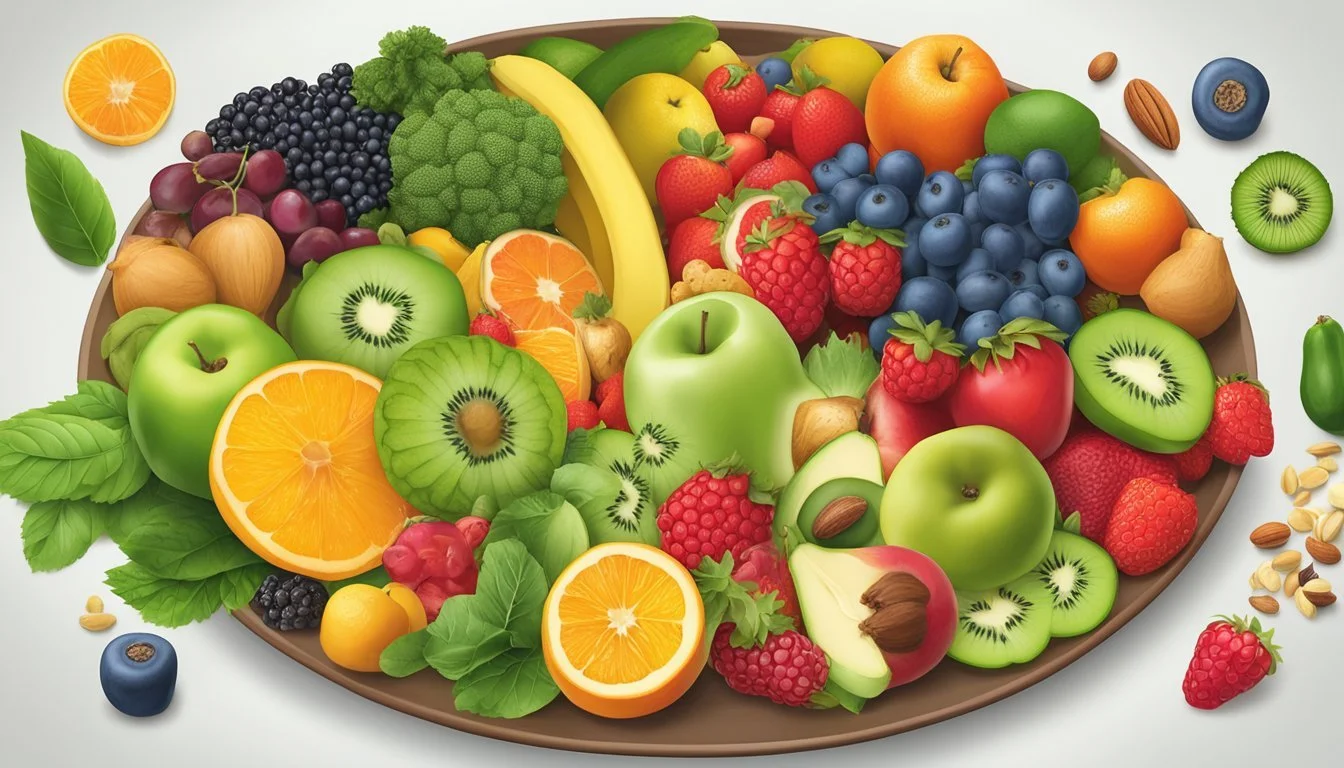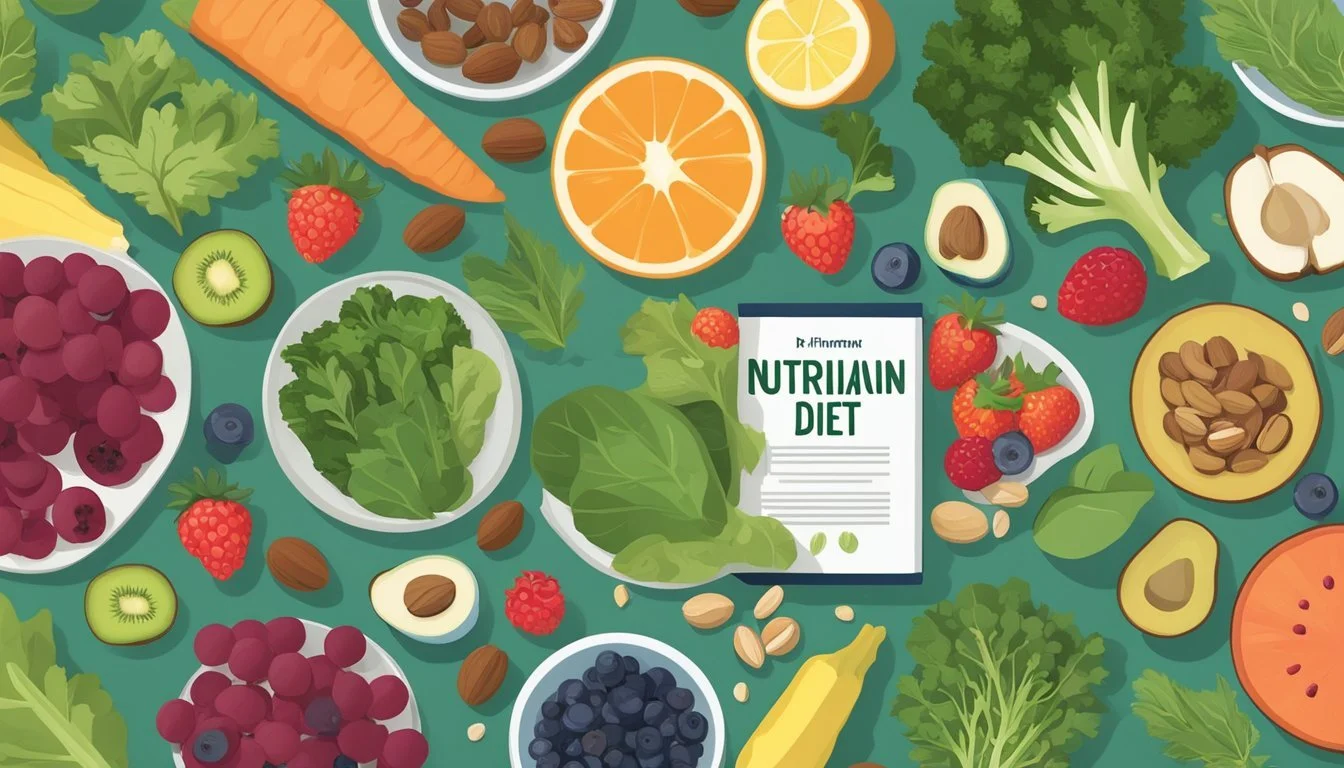Does the Dr. Fuhrman's Nutritarian Diet Work for Nutrient Density?
Evaluating Its Effectiveness
The Nutritarian Diet, developed by Dr. Joel Fuhrman, is founded on the principle of maximizing nutrient density in the diet. This approach emphasizes the importance of consuming foods that provide a high ratio of nutrients relative to their calorie content. The rationale behind the diet is based on the idea that a high intake of vitamins, minerals, and antioxidants, which are found in abundance in plant-based foods, can lead to better health outcomes, including weight loss, the reversal of chronic diseases, and a strengthened immune system.
Dr. Fuhrman proposes that by focusing on the nutrient density of foods, individuals can improve their health more effectively than through traditional diets concerned solely with calorie counting or macronutrient distribution. The Nutritarian Diet discourages the consumption of processed foods, animal products, and added salts and fats, favoring vegetables, fruits, legumes, nuts (What wine goes well with nuts?), seeds, and whole grains instead. This aligns with the scientific evidence suggesting plant-based diets are associated with lower body weights and reduced risk of chronic diseases.
Health is at the core of the Nutritarian Diet's philosophy, with an equation introduced by Dr. Fuhrman, H=N/C (Health = Nutrients/Calories), summarizing the diet's approach. By maximizing the intake of micronutrients per calorie, the Nutritarian Diet aims to optimize the body's function and promote longevity. Whether this diet delivers on its promises has attracted the attention of those looking to improve their dietary habits and health professionals alike, who are scrutinizing its potential benefits against standard dietary guidelines.
What Is the Nutritarian Diet?
The Nutritarian Diet emphasizes high nutrient intake per calorie consumed, primarily through plant-based foods. It's designed to promote health longevity and facilitate weight loss.
Principles of the Nutritarian Diet
The Nutritarian Diet focuses on consuming foods with a high Nutrient Density, specifically those that provide a substantial amount of vitamins, minerals, and other essential nutrients relative to their calorie content. Foods are chosen to maximize nutrients per calorie, with a particular emphasis on:
Greens: Leafy greens such as kale, spinach, and collard greens are staples due to their nutritional profile.
Beans: A variety of legumes are included for their fiber, protein, and micronutrient content.
Onions: Included for their phytochemical compounds.
Mushrooms: Consumed for their immune-boosting properties.
Berries: Chosen for their high antioxidant levels.
Seeds and Nuts: Encouraged for their healthy fats and nutrient content.
Books such as "Eat to Live" and "Eat for Life" by Dr. Joel Fuhrman outline this approach, where these components are often referred to as G-BOMBS (Greens, Beans, Onions, Mushrooms, Berries, and Seeds). Dr. Fuhrman asserts that by adopting this diet, one can achieve optimal health, reduce disease risk, and maintain a healthy weight.
The Nutrient Density Index (ANDI)
The Aggregate Nutrient Density Index (ANDI) is a scoring system introduced by Dr. Fuhrman that ranks foods based on their nutrient density. The scale runs from 1 to 1000, with 1000 representing the most nutrient-dense items. The Nutritarian Diet encourages the selection of foods with higher ANDI scores, which predominantly consist of vegetables, fruits, seeds, nuts, and beans. The purpose of the ANDI system is to guide individuals towards eating the most beneficial foods for health improvement. The diet suggests limiting or avoiding animal products, processed foods, and refined sugars to ensure a high intake of nutrient-dense plant-based foods.
Health Benefits
The Nutritarian Diet prioritizes high nutrient intake, aiming to enhance overall health and target specific health concerns. Its focus is on whole, plant-based foods, and it's designed to optimize nutrient density per calorie, thereby offering several distinct health advantages.
Chronic Disease Prevention
The diet's emphasis on nutrient-dense plant foods such as fruits and vegetables can reduce the risk of chronic diseases like cancer. These foods are rich in antioxidants and phytochemicals which are known for their role in cancer prevention.
Weight Management
Weight loss is facilitated by the Nutritarian Diet’s low-calorie yet high-nutrition approach, making it easier to maintain a healthy weight without hunger. Its high fiber content promotes satiety and helps prevent overeating.
Heart Health
The diet supports heart health by limiting the intake of processed and high-sodium foods. This can lead to lower blood pressure and improved cholesterol levels, thus reducing the risk of heart disease.
Diabetes Control
With its low-glycemic index, the Nutritarian Diet can aid in blood sugar management. The diet's composition can help prevent and even reverse chronic disease states such as type 2 diabetes by maintaining healthy blood sugar levels.
Immune System Enhancement
Nutrient-rich foods bolster immune defenses. High intake of vitamins and minerals from whole foods can enhance the immune system's efficiency, potentially speeding up recovery from illness and reducing susceptibility to infections.
Nutritional Composition
The Nutritarian Diet by Dr. Joel Fuhrman emphasizes high levels of vitamins, minerals, and phytochemicals in its framework. Its goal is to maximize nutrient density per calorie, focusing on both micronutrients and macronutrients to promote overall health and prevent disease.
Optimizing Micronutrient Intake
The Nutritarian Diet aims to elevate the intake of micronutrients, which include vitamins, minerals, and phytochemicals. These are essential for supporting body functions and maintaining a strong immune system. The diet encourages the consumption of foods that deliver a high concentration of these nutrients relative to their caloric content. Key sources in this diet are plant-based foods that are rich in nutrient adequacy, providing a high ratio of nutrients per calorie. Examples include:
Leafy greens and other vegetables
Fruits
Beans and legumes
Nuts and seeds
These foods are chosen for their high levels of micronutrients and their related health benefits, such as reduced inflammation and lower risk of chronic diseases.
Balancing Macronutrients
The Nutritarian Diet also focuses on a balanced intake of macronutrients – proteins, carbohydrates, and fats – to support overall health. It advocates for a moderate consumption of whole grains, legumes, and seeds to obtain sufficient protein and fiber. Special attention is given to the inclusion of omega-3 fatty acids, which are crucial for heart and brain health. Healthy fats are an integral part of the approach, with an emphasis on those derived from seeds, nuts, and avocados. The diet minimizes the intake of processed foods, which often have imbalanced macronutrient profiles and lower nutrient density. The strategic selection of macronutrients supports bodily functions and contributes to a feeling of satiety, aiding in weight management.
Dietary Guidelines and Foods
The Nutritarian Diet emphasizes a high intake of vegetables, fruits, legumes, beans, and seeds for their nutrient density, while recommending limited consumption of animal products, dairy, and processed foods, to promote overall health and wellness.
Recommended Food Groups
Greens: Crucial for their vitamins, minerals, and fiber. This includes all leafy greens such as kale, spinach, and Swiss chard.
Beans and Legumes: These are important sources of protein, iron, and other essential nutrients. Examples include lentils, chickpeas, and black beans.
Berries: Highly encouraged for their antioxidant properties. This encompasses strawberries, blueberries, and raspberries.
Seeds: Flaxseeds, chia seeds, and hemp seeds are recommended for their high omega-3 fatty acid content.
Vegetables: A variety of other vegetables, both raw and cooked, should make up a large portion of meals.
Fruits: Eaten in moderation due to sugar content, but still important for vitamins and fiber.
Whole Grains: Whole, minimally processed grains such as quinoa, barley, and brown rice provide energy and nutrients without the additives found in refined products.
Nuts: A source of healthy fats, but should be consumed in moderation due to high-calorie content.
Foods to Limit or Avoid
Animal Products: Including meat, poultry, fish; these should be reduced to small, infrequent amounts or avoided entirely.
Dairy and Eggs: Consumption of dairy and eggs should also be limited due to concerns about saturated fats and potential health risks associated with high consumption.
Processed Foods: Highly processed and refined foods are to be excluded from the diet.
Added Sugars and Oils: This encompasses all sugars that are not naturally occurring in whole foods and oils, including olive oil.
Cheese: Due to its high fat and salt content, cheese is often consumed in very limited quantities or avoided.
Added Salt: Emphasis on using herbs and spices to flavor foods instead of salt.
Implementation of the Nutritarian Diet
Transitioning to Dr. Fuhrman's Nutritarian Diet focuses on nutrient density, prioritizing plant-based meals rich in vitamins, minerals, and antioxidants. The strategy emphasizes health and weight management through whole, minimally processed foods.
Creating a Nutritarian Meal Plan
A Nutritarian meal plan involves structuring daily food intake around vegetables, fruits, seeds, nuts, and legumes. Meal plans typically exclude or minimize animal products, added salts, oils, and sugars. It is essential for individuals to plan their meals to include a variety of colored vegetables to ensure a broad nutrient intake. Sample Meal Plan:
Breakfast: Steel-cut oats topped with mixed berries and chia seeds.
Lunch: Large mixed greens salad with an assortment of raw vegetables, beans, and a nut-based dressing.
Dinner: Steamed green vegetables, a side of quinoa, and a portion of seasoned lentils.
Incorporating Nutritarian Recipes
Integrating Nutritarian recipes into a diet is straightforward when focusing on whole, plant-based ingredients. Recipes often have a base of greens, beans, onions, mushrooms, berries, and seeds—embraced as "GBOMBS" in Dr. Fuhrman's guidance for their health benefits. It's recommended to prepare meals from scratch to control the nutritional content.
Recipes to Try:
Hearty Vegetable Soup: Blend a variety of vegetables like carrots, spinach, and tomatoes with beans and spices for a nutrient-packed meal.
Berry Nutty Smoothie: Combine a mix of berries, spinach, flax seeds, and unsweetened almond milk for a quick nutritarian snack.
By following these steps, one can successfully implement a Nutritarian Diet, ensuring each meal is rich in nutrients and contributes to overall well-being.
Challenges and Considerations
When adopting Dr. Fuhrman's Nutritarian Diet, individuals must navigate the transition to a nutrient-dense, plant-based lifestyle, and understand the need for specific nutrient supplementation.
Adaptation to a Plant-based Lifestyle
The shift to a plant-based diet can be a significant adjustment, particularly for those accustomed to meat-centric meals. The Nutritarian Diet highly emphasizes fruits, vegetables, legumes, seeds, and nuts, while eliminating processed foods, dairy, and meats. Those new to vegan or plant-based eating may initially struggle with meal planning and ensuring diverse, palatable options that meet their nutritional requirements.
Nutrient Supplementation
While the Nutritarian Diet is rich in most essential nutrients, there are certain micronutrients that those on a vegan diet might be more at risk of being deficient in, notably B12 and iron. Supplementation may become necessary to ensure adequate levels.
Vitamin B12: Crucial for nerve function and the production of DNA and red blood cells. It is naturally found in significant amounts only in animal products, hence, supplementation is recommended.
Iron: Plant-based iron (non-heme iron) is less readily absorbed by the body compared to iron from animal sources (heme iron). Consuming foods high in vitamin C alongside iron-rich plant foods can increase absorption.
In some cases, other supplements such as omega-3 fatty acids, vitamin D, calcium, and zinc may also be needed to support overall health on the Nutritarian Diet. Individuals should consult with a healthcare provider to tailor supplementation to their specific needs.
Scientific Evidence and Criticism
The effectiveness of Dr. Joel Fuhrman's Nutritarian Diet is supported by scientific evidence focusing on longevity and criticisms based on its restrictiveness and potential drawbacks.
Research Supporting the Nutritarian Diet
Scientific studies highlight the Nutritarian Diet's emphasis on high nutrient density and plant-based foods, which are associated with various health benefits. Dr. Fuhrman, a New York Times bestselling author, has created this diet based on the principle that a high intake of nutrients—relative to calories—leads to better health and longevity. This regimen is marked by a consumption of common foods like fruits and vegetables, beans, seeds, and nuts, which are considered essential for a nutrient-rich diet. Crucial to his theory is the abundance of micronutrients these food categories provide without excessive caloric intake.
Critiques and Controversies
While there is a positive view on the diet's nutritious approach, it does not come without its critiques. Critics argue that the Nutritarian Diet could be too restrictive for some, leading to potential nutrient deficiencies if not properly managed, particularly in essential fats and proteins found in larger quantities in animal products. Additionally, the significant reduction of foods like whole grains and cooked foods as advised by the diet may be seen as controversial to traditional dietary recommendations. These aspects bring into light the importance of balancing diet plans with individual health needs and potential adaptations by healthcare professionals.
Societal Impact and Sustainability
Dr. Fuhrman's Nutritarian Diet emphasizes nutrient density in the foods one consumes. It inherently considers both the environmental impact of dietary choices and their nutritional efficacy. How this diet translates to broader societal adoption and sustainability is multi-faceted, involving environmental and population considerations.
Environmental Considerations
The Nutritarian Diet, with its emphasis on whole, plant-based foods, may offer environmental benefits due to the generally lower carbon footprint associated with plant agriculture compared to animal farming. Foods that are nutrient-dense, such as leafy greens, nuts, and seeds, are central to this diet and are typically less resource-intensive to produce. By prioritizing these foods, individuals who follow this diet could contribute to a reduction in greenhouse gas emissions.
Resource consumption: Plant-based diets require less water and land than diets heavy in animal products.
Greenhouse gases: Livestock agriculture is a significant source of methane, a potent greenhouse gas.
When Americans or others adopt a diet high in plant-based nutrients, there is potential for a sizable collective impact. However, the sustainability of this diet also depends on factors like local food availability and agricultural practices.
Adoption Among Populations
The success of the Nutritarian Diet's broad adoption hinges on its accessibility and acceptability to diverse populations. In terms of nutritional adequacy, it is designed to provide all necessary nutrients through a carefully planned intake of vegetables, fruits, beans, nuts, and seeds. For sustainability, the diet must be adaptable to various economic and cultural contexts.
Economic access: Nutrient-rich foods must be affordable and accessible to all sectors of society to ensure widespread adoption.
Cultural acceptance: Dietary changes are sustainable when they are compatible with cultural dietary preferences and practices.
The Nutritarian Diet's rich variety of plant-based foods could be appealing, but it requires education and resources to facilitate its integration into the daily lives of Americans and others worldwide. Efforts to increase its adoption must consider these societal and sustainability aspects to foster long-lasting dietary shifts toward nutrient density.
Resources and Community Support
When individuals embark on Dr. Fuhrman's Nutritarian Diet, they have access to a variety of resources and community support mechanisms. Membership in Dr. Fuhrman's online community provides invaluable support for those seeking to adopt the nutrient-dense diet. This membership typically includes:
Diet Plans: Customizable meal plans that align with the Nutritarian principles.
Recipes: Access to a collection of recipes designed to optimize nutrient intake.
Forums: Discussion platforms where members can share experiences and advice.
Moreover, members may benefit from coaching services that can offer personalized guidance on meal planning and health strategies. They also gain access to educational content such as webinars and newsletters that help deepen their understanding of nutritarian concepts.
Community support plays a crucial role in the success of adopting the Nutritarian diet. Here, individuals can find:
Local Groups: Some may find local chapters or meetup groups with others following the Nutritarian lifestyle.
Online Communities: Social media groups and online forums where people encourage each other and share their journeys.
Below is an overview of membership benefits:
Benefit Description Meal Plans Tailored to promote nutrient-dense eating habits. Nutritarian Recipes Diverse options to maintain interest and satisfaction. Educational Content Materials to enhance knowledge on nutritarian principles. Personal Coaching For fine-tuning diet and addressing individual concerns. Community Forums Platforms for support and sharing the Nutritarian lifestyle.
These resources and support systems enable individuals to adhere more easily to the Nutritarian Diet, fostering an environment for successful dietary changes and health improvement.






